From Farm To Table
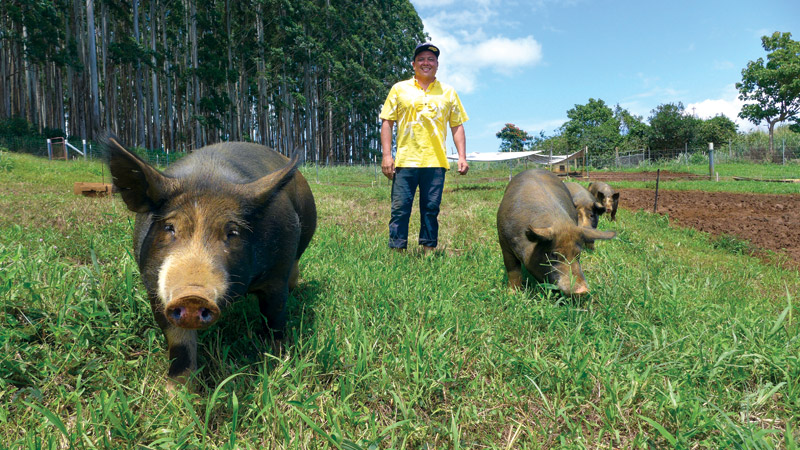
The owners of Napua Restaurant, including Brandon Lee, have taken a farm-fresh approach to culinary sustainability by raising their own pigs, thus ensuring that customers are treated to luxury-level pork.
Looking for a way to compete with the big resorts of the Kohala Coast, Napua restaurant co-owner Brandon Lee and his brother-in-law, chef Keoni Regidor, took a big risk. Their goal: to stand out by bringing the concept of farm-to-table to the next level. They would end up creating something that no one else in Hawai‘i is doing.
“We had no buzz. We didn’t know how to say we were here,” recalls Lee, who started Napua in 2010. He and Regidor named it after Regidor’s mother, who had passed away when the two were in middle school. “The restaurants on that side just seemed way out of our league. We had no idea how we were going to be able to differentiate ourselves from them and also be as successful as they were. We are talking names like Roy Yamaguchi, Peter Merriman and Alan Wong, and restaurants like Canoe House, Brown’s Beach House and those at Four Seasons Resort. They all had great food, great locations and big budgets.”
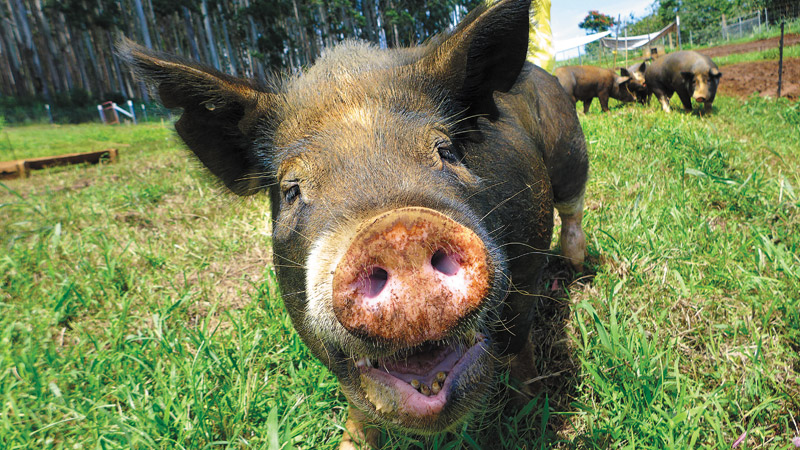
Kaunamano Farm breeds Berkshire pigs.
Lee and Regidor, who had already been running Napua at Mauna Lani Beach Club for three years, were motivated to set the restaurant apart. They were, like many other spots in the area, already focusing on staples like sustainable, locally grown ingredients. After a trip to visit a friend working at a Santa Cruz farm, however, they realized how they were going to stand out.
“We were going to raise our own animals and serve them on our own table,” says Lee. “No one else was or is doing that here. I came home, bought some poster board paper from Longs and started drawing plans for (my own) farm. That was six years ago.”
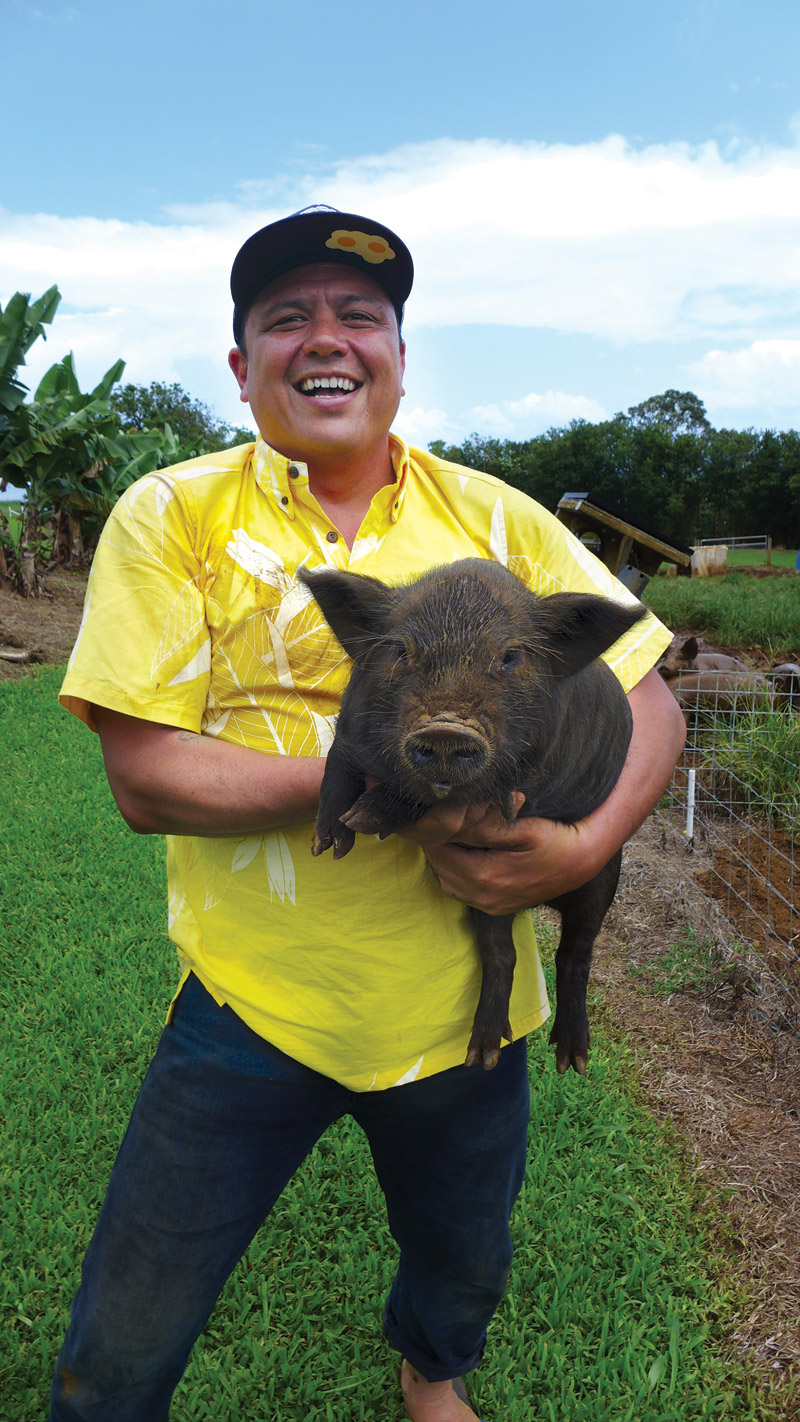
Brandon Lee poses with a little piglet.
Lee, 38, applied to the Kamehameha Schools’ Mahia‘ai Matchup Program, an agricultural startup competition that was awarding not only acreage but also seed money to farmers with the most innovative ideas.
“The competition started with 127 applicants that were narrowed down to 10 and then three,” says Lee. “We were awarded second place, and that gave us $15,000 (in 2014) and 20 acres. With that money, I bought a fence and six female Berkshire pigs (gilts) from Santa Rosa, California.”
Thus, Kaunamano Farm was born. Why pigs?
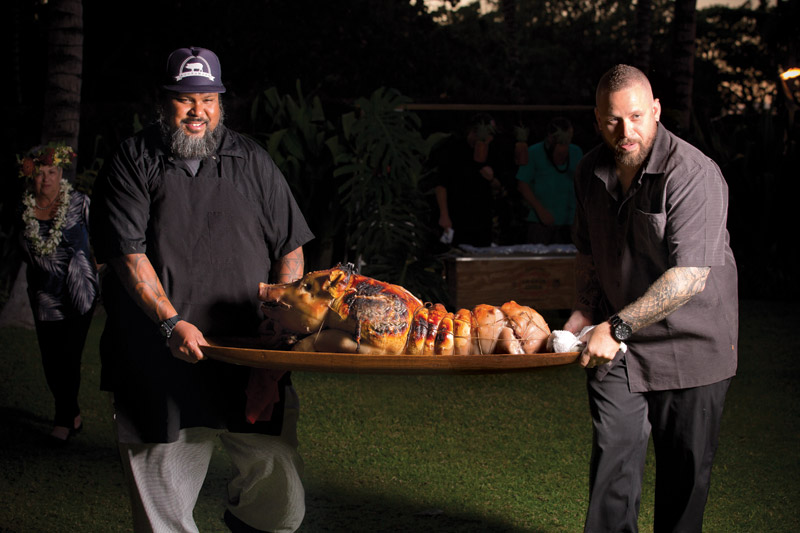
Napua Restaurant chef Keoni Regidor gets some help carrying a cooked pig. CHRISTOPHER BOBEK PHOTO
“Growing up, pigs were thriving outside,” says Lee, a travel industry management and international business major with a graduate degree in marketing. “I just assumed Hawai‘i was the best climate to raise a pig.”
He knew he didn’t want just any old pig, either.
“It needed to be high quality — a luxury-level type pork,” Lee says. “Many people are familiar with Japan’s Kurobuta pork, and that’s the same breed as our Berkshire pigs.”
Lee, who once did marketing for Mercedes-Benz in Los Angeles, had no prior knowledge of how to run a farm, though.
“In the beginning … how do you know what looks like a good pig or a bad pig?” he says. “What does the muscle structure look like? Which pigs do well on pastures? How much rainfall can they handle?”
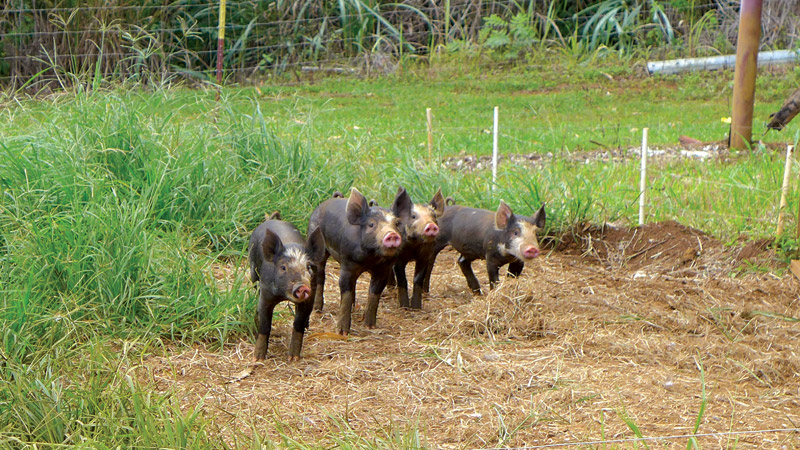
Napua Restaurant’s Kaunamano Farm raises its pigs from birth.
He learned as he went, with the help of Google, YouTube and some good old-fashioned books.
“I learned how to artificially inseminate a female pig in the pasture with no farrowing crates or any inhumane practices,” he says. “I learned how to assist in birthing the piglets, too. I’m so confident, in fact, that if my wife had another kid, I may not even call the doctor!”
Today, Kaunamano Farm is home to more than 80 pigs, which Lee refers to as the “Royal Herd.”
“I raise these pigs as if I was working for King Kamehameha himself,” he says.
The biggest difference now, Lee believes, is time and experience.
“There are so many mistakes you have to make to get from there to here,” says Lee. “You’ll never stop making mistakes, but you can find the answer somewhere. There are so many obstacles to farming.
You just have to keep going.”
What works is his holistic, system-based approach to Berkshire hog-raising.
“It’s predicated on intensive pasture management and rotational open-air grazing,” Lee explains. “The rotation allows for both livestock production as well as soil capable of producing quality vegetables.”
Lee says his pork is the best in the state (and perhaps the country).
“Now, we are slowly moving from the goals of growing
the herd and raising quality pork to production and processing.”
With this luxury pork, Lee and Regidor have created the “Best. Hot dog. Ever.”
It took at least 40 tries to come up with the winning recipe.
“Thai basil, lemongrass, black garlic, curry … we tried it all,” says Lee. “The flavor we finally decided on is traditionally based with a slight local flair.
“I might be biased, but it’s the freshest hot dog I have ever tasted. The texture and flavor of pasture-raised Hilo pork is clean and complex. It’s really impressive.”
The difference, he explains, is how clean the fat is. “It’s not gristly or thick; it’s like coconut oil,” he says.
“It tastes like the pigs graze in a pasture that’s sunny during that the day and enjoys rain at night.”
His herd is fed a steady diet of tropical fruits, including guavas and star fruit, Okinawan sweet potatoes, macadamia nuts, and bananas from Lee’s own orchard. The pigs might even enjoy the occasional malasada when “I need them to do something they don’t want to do,” jokes Lee.
Lee and Regidor turn the pork into more than just hot dogs, too. Look for menu items like seasonal brined and sous vide pork loin, as well as ham, bacon, porchetta, salami, prosciutto and pork rillette.
Lee says that chef Regidor, also his best friend, is the “best chef no one has heard of.”
“His flavor, style and techniques are the best on the island,” he explains. “He’s the only chef I know breaking down whole pigs and creating such innovative dishes.”
Regidor refers to his style of cooking as “nostalgic Hawai‘i regional food.”
“I like to show respect for the old dishes of Hawai‘i but with a modern spin,” he says. “It’s rare. But we can cater our menu to have what we want, not just what’s in season. As a chef, it keeps me on my toes. Nothing stays the same. And we are careful to use our pigs wisely because we know there is a limited amount.”
Lee says that they decided to make agriculture, farming and freshness what defines them.
“There’s something powerful about raising your own animals and going through the process and creating something like a hot dog or a product that you’re feeding yourself and your family. There’s something powerful about being self-sustaining.”
He notes that the local pork industry in Hawai‘i has been slowly dying.
“In the 1970s, Hawai‘i was harvesting more than 60,000 pigs a year. Last year, Hawai‘i harvested only 1,800. We should all be eating local products because it’s good for Hawai‘i, it’s good for our community, it’s good for a better, more sustainable future for our state.”
Lee says he hopes to increase the value of Hawai‘i’s homestead agriculture.
“I want to create a place-based system that will allow someone to use their family’s land — whether it be 5, 10, 20 or 100 acres — and to be able to make a living they can be proud of.”
Farming, he says, is the best work.
“For me, I like to be outside; it makes me more connected to everything about Hawai‘i,” says Lee. “You start to pay attention to the weather and how things grow. You can learn so much from working on a farm that you can relate to everything else in your life. It helps you learn about your kids and to pay more attention, to not be so quick to judge or think you have all the right answers.”
Lee’s vision has also grown into something with a much larger scope over the last few years.
“I was just going to farm a few pigs for the restaurant,” he says. “Now we are trying to have a conscious positive impact on Hawai‘i.”
Napua at Mauna Lani Beach Club is open to the public for dinner nightly. Reservations are required. Visit napuarestaurant.com for more information.

